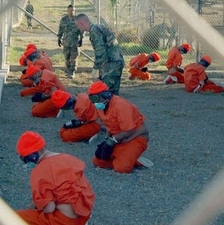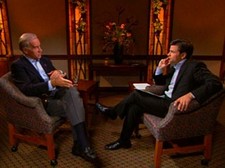by Andy Worthington
|
|
Will the Bush administration be held accountable for war crimes? The answer ought to be yes, if the verdict of the Senate Armed Services Committee Inquiry into the Treatment of Detainees in US Custody is to mean anything. The bipartisan report, released on December 11 by senators Carl Levin and John McCain, concluded that the torture and abuse of prisoners was the direct result of policies authorized or implemented by senior officials within the current administration, including President George W. Bush, former Defense Secretary Donald Rumsfeld, and Vice President Dick Cheney's former legal counsel (and now chief of staff) David Addington.
Since the scandal of the abuse of prisoners at Abu Ghraib prison in Iraq broke in April 2004, over a dozen investigations have identified problems concerning the treatment of prisoners in Iraq, Afghanistan and Guantanamo, but until now no official report has looked up the chain of command to blame senior officials for authorizing torture and instigating abusive policies. The Bush administration has been able to maintain, as it did in the wake of the Abu Ghraib scandal, that any abuse was the result of the rogue activities of "a few bad apples."
This is now untenable. As the report states: "The abuse of detainees in US custody cannot simply be attributed to the actions of 'a few bad apples' acting on their own. The fact is that senior officials in the United States government solicited information on how to use aggressive techniques, redefined the law to create the appearance of their legality, and authorized their use against detainees. Those efforts damaged our ability to collect accurate intelligence that could save lives, strengthened the hand of our enemies, and compromised our moral authority."
Though containing little new information, the report is damning in its revelation of how senior officials sought out and approved the reverse engineering of techniques taught in the US military's SERE schools (Survival, Evasion, Resistance, Escape) for use on prisoners captured in the "war on terror." These include "stripping detainees of their clothing, placing them in stress positions, putting hoods over their heads, disrupting their sleep, treating them like animals, subjecting them to loud music and flashing lights, and exposing them to extreme temperatures." In some circumstances, the measures also included waterboarding, a notorious torture technique which involves controlled drowning.
After noting that these techniques were taught to train personnel "to withstand interrogation techniques considered illegal under the Geneva Conventions," and that they are "based, in part, on Chinese Communist techniques used during the Korean war to elicit false confessions," the authors laid out a compelling timeline for the introduction of the techniques, beginning with a crucial memorandum issued by Bush on February 7, 2002. This stated that the protections of the Geneva Conventions, which the authors noted "would have afforded minimum standards for humane treatment," did not apply to prisoners seized in the "war on terror."
Having
established Bush's role as the initial facilitator of abuse, the report
then implicated those directly responsible for implementing torture,
explaining how Pentagon general counsel William J. Haynes II began
soliciting advice from the agency responsible for SERE techniques in
December 2001, and how Addington, Justice Department legal adviser John
Yoo, and White House counsel Alberto Gonzales attempted to redefine
torture in the notorious "Torture Memo" of August 2002. The memo
claimed that the pain endured "must be equivalent to the pain
accompanying serious physical injury, such as organ failure, impairment
of bodily function, or even death."
The authors also noted how Rumsfeld approved the use of SERE techniques at Guantanamo in December 2002 (after Haynes had consulted with other senior officials), and explained how the techniques migrated to Afghanistan in January 2003, and were implemented by Lieutenant General Ricardo Sanchez, the commander of coalition forces in Iraq, in September 2003.
Even so, the report is not without its faults. The authors carefully refrained from ever using the words "torture" or "war crimes," which is a considerable semantic achievement, but one that does little to foster a belief that the officials involved will one day be held accountable for their crimes. They also, curiously, omitted all mention of Vice President Dick Cheney, and ignored the importance of the presidential order of November 2001, which authorized the capture and indefinite detention of "enemy combatants," even though Barton Gellman of The Washington Post has established that Cheney played a significant role in this and all the other crucial documents that led to the torture and abuse of detainees.
Responses in the US media have been mixed. Oddly, most major media outlets chose to focus solely on Rumsfeld's responsibility for implementing abusive techniques. More thoughtful commentators have questioned whether Barack Obama would pursue those responsible, noting that he will be unwilling to antagonize Republicans, whose support he needs to tackle the economic crisis, and that many Democrats in Congress knew about the administration's policies, and in some cases were involved in approving them. A recent article in The Nation noted that such complicity made "an unfettered review seem unlikely," but the article also noted, more hopefully: "A growing body of legal opinion holds that Obama will have a duty to investigate war crimes allegations and, if they are found to have merit, to prosecute the perpetrators."
As of December 17, those concerned with pursuing Bush administration officials for war crimes can at least be assured that the perpetrators now include Cheney. In an interview with ABC News, the vice president stuck to a now-discredited script, declaring "we don't do torture, we never have," but admitted for the first time that he knew about the use of waterboarding on a handful of "high-value detainees," and that he considered its use in their cases "appropriate."
Only time will tell if Cheney's admission will be regarded as a stalwart defense of national security, or as the last defiant gesture of a war criminal.



